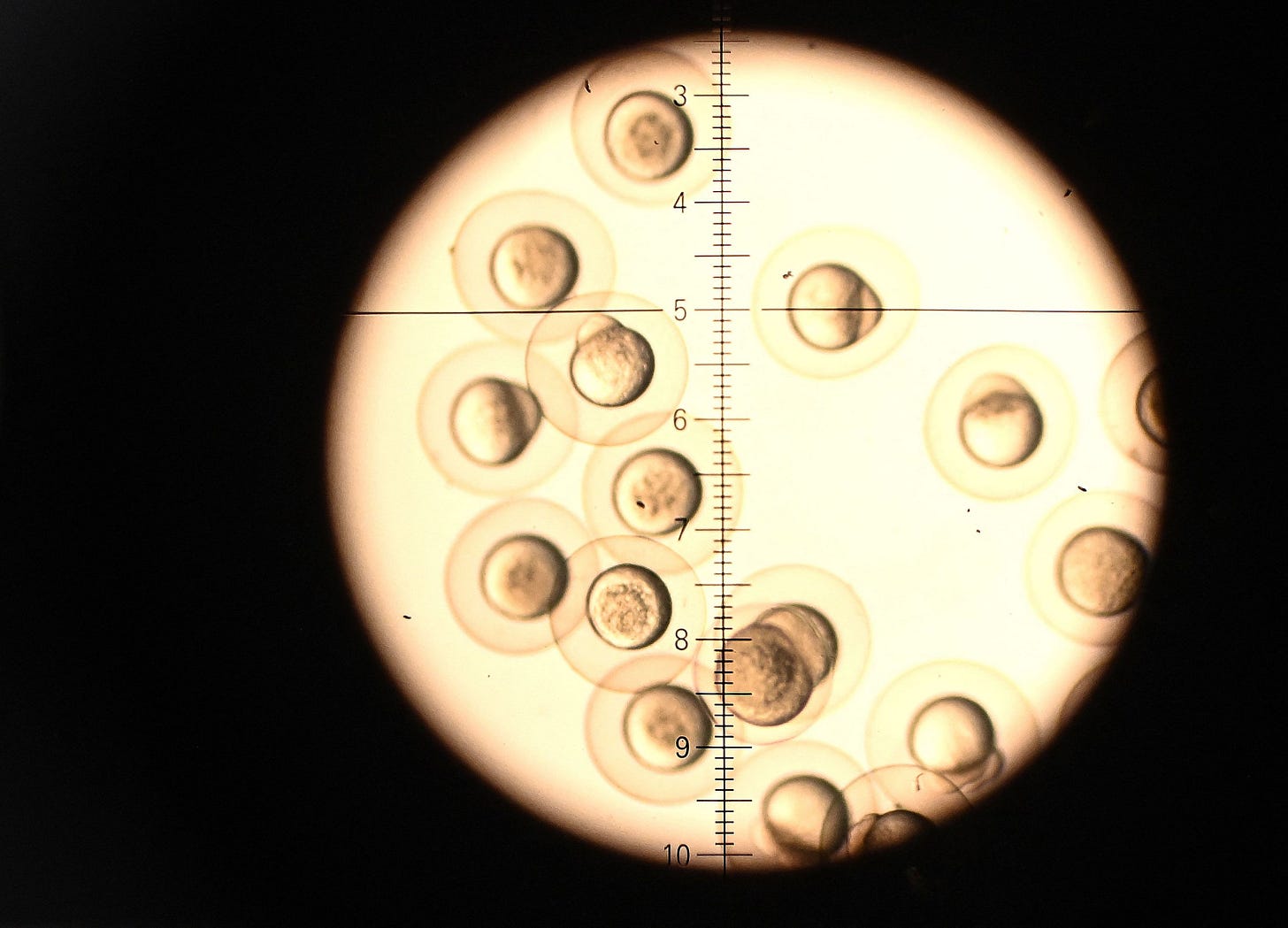My Problem With IVF — And Ours
The creation of human embryos as a means to an end.
Longtime Dishheads know my basic position on “reproductive freedom.” For all my Catholicism, I’m for it.
I believe in maximal sexual freedom for consenting adults in private. I favor widespread use of contraception to lower the odds of abortions and to foster the chances of wanted and loved children in stable families. I don’t believe that every sexual act can or should be open to procreation. I support legal abortion rights for all women, even though I personally cannot accept the morality of consciously ending a human life, especially one so vulnerable in the womb. But, critically, it is not my womb, and never could be, and women have an unalienable property right in their own body, even if it cradles another one within it. If we do not have agency over our own body, we have no agency and thereby no freedom at all. You gotta habeas the corpus.
Yes, this is in part an excruciating contradiction. But living in a liberal democracy requires excruciating contradictions all the time. That’s the core of what toleration in modernity means. It’s never easy. And no one designed it to be.
And there are, in any case, genuine questions about when a human life becomes a person with rights that cannot be definitively resolved, leaving the issue open to very reasonable doubt. And we should defer to each others’ right to differing judgments in our own respective lives and actions — even on as profound a matter as when life begins. Even Aquinas believed personhood begins 40 days after conception. The issue wasn’t settled then and it isn’t settled now.
And I’m in favor of any and all methods to help couples facing fertility issues. (That goes for gay and lesbian couples as well, of course, who cannot have kids by the conventional “mutual-fucking” technique.) And it has become somewhat disturbing that many on the theocon right have begun to target surrogacy as something that should be banned, even when all the relevant parties are quite clearly acting with full awareness and agency in engaging in it. If the mother has freely chosen this path, it is her decision and no one else’s. That too is what living in a liberal society requires.
So why do I find myself balking at some aspects of in vitro fertilization, or IVF?
The subject is fresh again. Alabama’s Supreme Court ruled in February that IVF was illegal under a 1872 state law that allowed parents to sue over the wrongful death of a minor child. The Southern Baptist Convention adopted a resolution opposing IVF last week, after which the Senate Democrats tried and failed to advance a bill protecting IVF access. The Democrats are politically smart on this: IVF remains hugely popular — on right and left, and it’s a better wedge issue than even abortion. Last month, a Pew survey found 70 percent support for the view that having access to IVF is a good thing; and even 60 percent of pro-lifers support access to IVF. It is, after all, an attempt to bring new life into the world, rather than to destroy it. Last week, Gallup found that 82 percent support the morality of IVF.
So why has it always made me queasy? It is not because I believe, as the Catholic Church teaches, that every child must be conceived through the sexual intercourse of a married couple, and that anything else is a violation of God’s law:
IVF involves the use of artificial means to achieve pregnancy outside of sex between a husband and wife, or “the marital act” — a disassociation that the Church teaches is contrary to the dignity of both parents and children.
I think, in fact, that a certain amount of “disassociation” is perfectly defensible if it is the only way of bringing a new life into the world. So what’s my problem?
The Alabama ruling focuses on the critical fact that in order to maximize the chances of just one successful human baby, you need to create multiple embryos to beat the high odds of reproductive failure. And once you’ve succeeded in implanting one future baby, you are inevitably left with the “spare” embryos, which you can then choose to freeze for future use, or donate to someone else, or — in the delicate language deployed in most medical descriptions — “discard”.
Money quote from the decision:
The central question presented in these consolidated appeals, which involve the death of embryos kept in a cryogenic nursery, is whether the Act contains an unwritten exception to that rule for extrauterine children — that is, unborn children who are located outside of a biological uterus at the time they are killed. Under existing black-letter law, the answer to that question is no: the Wrongful Death of a Minor Act applies to all unborn children, regardless of their location.
The law banning abortion, in other words, also directly bans IVF for the exact same reasons. An embryo is an embryo; and all embryos are human persons, however they were conceived. I suppose you can bash the justices for this kind of judicial activism. But what choice did they have, given the law they were interpreting?
“Discard”, moreover, is not just a euphemism. It’s an accurate description of what is going on. Discard, in the dictionary, means “to cast aside or dispose of; get rid of: to discard an old hat.” And in this case, it refers to several future human beings. Worrying about this is not — and should not be — restricted to religious fanatics. That same Gallup poll, for example, found that support for IVF went from 82 percent to 49 percent once the destruction of spare embryos was considered.
The number of embryos, mind you, is usually quite small. It varies depending on the age of the would-be mother — because fertilization is a crap shoot and you can get way more babies than you hoped for or way less. A typical procedure might yield just one viable embryo from, say, 12 in vitro; or it might, in very rare cases, yield 12. But in almost every case, a handful of human embryos is left over.
And that’s the rub for me. In many cases, you’re creating new lives only to destroy them as waste. In many others, you don’t destroy them; you merely use them to beat the odds. They are quite simply a means to an end, violating a basic norm of inviolable human dignity. And these “means” are your own offspring. IVF literally requires a mother to play Sophie’s Choice several times over.
And it’s harder to put these discarded humans out of your mind the way you can recover from an abortion, once the fetus has been dispensed with. Because they are still alive! By freezing them, you are conceding that they can one day change from a human being to a human person, with all the profound ramifications of that. And you may already have in front of you a growing IVF-created child who now has several siblings alive, just frozen in perpetual darkness.
That’s what brings it home to me. There are now more than 600,000 future human beings sitting in “cryogenic nurseries” waiting for the light to come on — millions of brothers and sisters, sons and daughters, consigned indefinitely to living in vitro. Yes, the embryo has no memory, no sentience when frozen, no mind or will yet. There is no suffering. But the lack of suffering does not mean there is no sadness. Or no humanity.
It’s also fair to acknowledge that our natural reproductive system when functioning normally is built in exactly the same way that IVF is designed: to create excess in order to guard against failure. And so we shouldn’t get too squeamish here — or become more protective of incipient human life than nature is. But at the same time, you also have to acknowledge that the IVF process, unlike nature, requires a human consciously picking and choosing the most viable embryo to keep alive, using DNA as a guide. In any other context, that is a form of eugenics — something many defenders of IVF are usually horrified by.
I don’t find this an easy position to take. I have good friends who have used these methods to have wonderful children. But the wonderful children always remind me of the equally wonderful brothers and sisters these kids have left behind in limbo. And the conscious choice to create a human life, and to keep it alive in perpetuity, but never allow it to breathe a single breath, disturbs me.
We all know parents who love one child more than the others — although love for every single one is hardwired within us. But this is loving one so much more you either kill the rest of her siblings, or consign them to eternal darkness — a limbo to surpass all limbos. In the non-utilitarian moral universe I live in, sacrificing many sons and daughters to create one is simply wrong. And if you see in humanness anything equivalent to an inviolable and eternal soul, it is evil.
Even when it is so plainly and patently motivated by good.
(Note to readers: This is an excerpt of The Weekly Dish. If you’re already a subscriber, click here to read the full version. This week’s issue also includes: my personal view of Keir Starmer as he prepares to become the next prime minister; a wonderful chat with Elizabeth Corey about our favorite philosopher; reader pushback on my JD Vance column; a ton of listener dissent and other feedback on Nellie Bowles and many other episodes; six notable quotes from the week in news, including two Yglesias Awards; 20 pieces we recommend on Substack on a variety of topics; a Simpsons throwback for a Mental Health Break; a disquieting window in Bergen, Norway; and, of course, the results of the View From Your Window contest — with a new challenge. Subscribe for the full Dish experience!)
From a new subscriber:
I left you back when you wouldn’t stop writing about the Iraq War and George W Bush, and I don’t really like your views on Israel — but your writing, and now your podcast, are essential. You articulate what I know and believe but can’t voice.
From a happy subscriber:
I’m renewing my subscription once again. I’ve been with you on Substack since the beginning and look forward to the Friday newsletter every week — except in August when you’re on holiday on the Cape!
A Word About Keir
I keep being asked to offer my insight into the next prime minister of Great Britain, Keir Starmer, because we went to school together for several years, took the same public bus every day there and back, sat next to each other in class for five years, and spent almost our entire time arguing passionately and loudly about politics. One of us was going to be prime minister, our peers once joked. The joke is now on them.
(Read the rest of that piece here, for paid subscribers)
New On The Dishcast: Elizabeth Corey
Elizabeth is an academic and writer. She’s an associate professor of political science in the Honors Program at Baylor University and the author of the 2006 book, Michael Oakeshott on Religion, Aesthetics, and Politics. She also writes for First Things and serves on the board of the Institute on Religion and Public Life. After many of you asked me to do a podcast on my intellectual mentor, we delve into the thinking and life of Michael Oakeshott — the philosopher I wrote my dissertation on.
Listen to the episode here. There you can find two clips of our convo — on the genius who shirked fame, and my sole meeting with Oakeshott. That link also takes you to commentary on our episodes with Nellie Bowles on woke capture, George Will on conservatism, Bill Maher on religion, Daniel Finkelstein on marital support, Noah Smith on “information tournaments,” and Nicholas Wade on the lab-leak theory. Plus some thoughts on Pride Month and puppy training for Truman.
Browse the Dishcast archive for an episode you might enjoy (the first 102 are free in their entirety — subscribe to get everything else). Coming up: Tim Shipman on the UK elections, Erick Erickson on the left’s spiritual crisis, Lionel Shriver on her new novel, Bill Wasik and Monica Murphy on animal cruelty, Van Jones, and Stephen Fry! Send any guest recs, dissents, and other comments to dish@andrewsullivan.com.
Dissents Of The Week
A reader responds to my latest column:
I was both perplexed and amused at the contortions you had to perform in order to say something nice about JD Vance while, necessarily, acknowledging his present canine subservience to Donald Trump. I think this is much simpler than you argued. Like other ambitious paladins of the Trumpublican Party (Graham, Scott, Hawley, Cotton, Cruz, Stefanik, etc.), Vance knows perfectly well — and has publicly acknowledged — that Trump is intellectually and morally unfit for that office. But like the rest of them, Vance is a craven careerist lickspittle and hypocrite who has determined that his personal ambition requires him to bend the knee, the country be damned. That is the entire story.
Read my response here, along with three other dissents. More dissents on different topics are over on the pod page. As always, keep the criticism coming: dish@andrewsullivan.com. And you can follow more Dish discussion on the Notes site here (or the “Notes” tab in the Substack app).
In The ‘Stacks
This is a feature in the paid version of the Dish spotlighting about 20 of our favorite pieces from other Substackers every week. This week’s selection covers subjects such as Trump’s demagoguery, the greenlash against the Dems, and a highly preventable murder in Portland. Below are a few examples:
Kiyah Willis, a former enby, gets personal about why she left the left — “not your typical red pill narrative.”
Tara Ella, a trans woman, stands up for normie politics — “pro-fact, pro-science, and skeptical of narratives.”
My best mate at Oxford joins the Free Press and calls the US the Soviet Union. Welcome, Niall!
If you have any recommendations for “In the ‘Stacks,” especially ones from emerging writers, please let us know: dish@andrewsullivan.com. On that note, a reader writes:
That was a great debate you linked to last week between Richard Dawkins and Ayaan Hirsi Ali. She’s a superb representative of Christianity, genuine, and not strident or dogmatic.
I recommend not one, but two unusually great pieces this week that I’m guessing you’ll find interesting. The first is a very eloquent quick read by a MTF transitioner, Corinna Cohn, reflecting on what she thought transitioning would deliver and, after many years, how it didn’t do that. And it’s on the impermanence of all that we hold dear.
The second and more important piece is by Freya India, on how the decrease in mental health is due to the West’s abandonment of religion (which has always been my opinion, though tech is a secondary cause).
The View From Your Window Contest
Where do you think it’s located? (The beagle cartoon was added to obscure a sign.) Email your guess to contest@andrewsullivan.com. Please put the location — city and/or state first, then country — in the subject line. Proximity counts if no one gets the exact spot. Bonus points for fun facts and stories. The deadline for entries is Wednesday night at midnight (PST). The winner gets the choice of a VFYW book or two annual Dish subscriptions. If you are not a subscriber, please indicate that status in your entry and we will give you a free month subscription if we select your entry for the contest results (example here if you’re new to the contest). Contest archive is here. Happy sleuthing!
The results for this week’s window are coming in a separate email to paid subscribers later today. Here was the best window guess from last week:
To determine the exact window, I enlisted the help of our seven-year-old son. (Sorry, seven and a half!) We walked to the museum this week after getting out of a doctor’s appointment nearby. He enjoyed looking for clues in the picture to figure out which window it was. After a brief miscommunication about whether we were counting windows from left to right, or right to left, we agreed on this window:
Turning this into a family affair made this a fun contest!
Fantastic. Another family affair comes from the self-described wine geek in San Francisco:
I introduced my brother and sister-in-law to the contest while I was back home in Hawaii. At first they thought I was nuts and that the contest was impossible. But after playing around with this week’s VFYW for a bit, they started to get into it. It helped that we were sipping my sister-in-law’s homemade limoncello, which I think she should market. It’s better than anything I had on my recent trip to Italy, in my humble opinion.
See you next Friday.






